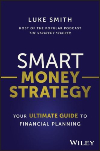If you want to give yourself the best chance of achieving financial success, taking the time to set strong foundations is essential. In this edited extract from his book, Smart Money Strategy, Luke Smith reveals the five foundations that can help you reach your financial goals.
Just as you would when you’re building a house, when you are making plans for your financial future, you’ve got to spend some time looking at the foundations that you plan to build upon. There are five foundational principles you need to think about if you’re serious about achieving your goals (your ‘why’) and making changes that will impact your life. Let’s take a closer look at these foundations.
Foundation 1: Respect your earnings
For most of us, earnings (or income) are what we receive in return for going to work. Earnings also include money you receive from other sources, such as dividends from shares, interest on term deposits, rent from a property investment or the income earned from any other investments.
Why are earnings important?
Earnings are important for two reasons:
- Your earnings income funds your living needs for today.
- Your earnings have the ability to fund the goals that you want to achieve in the future; plus, income will be the backbone of your retirement planning and lifestyle in your later years.
Things to be mindful of
While most of us think about the weekly and monthly income we get, we fail to see how important that income is over a working life. It is likely to be your biggest source of earnings.
For example, $1,500 a week translates into an income of $78,000 a year. Over a 45-year career, that $78,000 a year is actually worth $3.51 million! That’s not an insignificant figure, yet most of us don’t think about the long-term value of our incomes.
I want you to pause for a moment and take out a calculator. Work out your annual after-tax income number and jot it down. Multiply the number of years you have left in the workforce by your current annual take-home pay. I bet the number surprises you.
Breaks in work to start families, redundancies and career changes can all interrupt our earnings. On the plus side, promotions and pay reviews can positively increase our earnings.
Additionally, don’t dismiss your investment earnings; instead, consider how you might reinvest them. Many Australians are surprised that with some long-term planning, they can put a savings and investment plan together that replaces the income that they receive from going to work every day.
Foundation 2: Pay attention to your spending
For most of us, spending (or our expenses) is what we do with our income after we earn it. Expenses come in many forms, from groceries to petrol; from utilities like your telephone, internet, electricity and water to even bigger expenses, such as buying a car or home.
You might think some expenses aren’t important — for example, that cup of coffee you grab on your way to work or that chocolate bar you pick up at the checkout each week. However, sometimes it’s the small things that we don’t pay attention to that cost us more than we’d care to spend over the longer term — if we’d thought about it.
Imagine that daily workday coffee costs you $4 each day. Over five days, that’s $20. Over 48 working weeks, assuming you take four weeks’ annual leave, that’s $960. Over five years, your workday coffee costs you $4,800. Is there something else you’d rather be spending that money on? Perhaps an overseas holiday?
How about that weekly chocolate treat? Each time, say it costs you $3. Over five years, it costs you $780. Now, $780 isn’t $4,800, but if you have enough of these small, coffee and chocolate kinds of habits the money starts to add up.
Just like thinking about your earnings over the longer term, it’s also worth your while to think about your spending over the longer term too.
Why is spending important?
Spending is important as it directly impacts your ability to save money. Without the ability to save money, trying to achieve your lifestyle and financial goals would be like poking yourself in the face with a stick. Painful, a waste of time, and it would surely leave you uninspired!
Spending is also an opportunity cost. This means you have the opportunity to get something now by spending, or you have the choice to not spend right now, and save for something in the future.
Things to be mindful of
Beware of those habitual purchases that don’t seem like much at the time. Those habits, repeated frequently, may cost you more than you think over time.
That doesn’t mean you can’t have any treats or fun in the short term when you’re trying to achieve your medium- and long-term lifestyle and financial goals – it’s just about planning for what you actually want. If a daily coffee is something you don’t want to give up altogether, look to save some money elsewhere – perhaps by reviewing your utility providers, so you can change providers to find savings. By finding savings in areas of your life that you’re less attached to, you may find it easier to make the savings.
If you’re serious about wanting to achieve your financial goals, then you need to think more about how you spend and make a plan. It will give you the ability to focus on what’s actually important to you.
I also like the idea of value-checking. When you go to make a purchase, whether it is a day-to-day purchase or a larger purchase, stop and give yourself some time to review your spending and think, “Is this value for money?” Ask yourself, “Do I need to buy the most expensive brand to get the value out of this purchase?” Probably not.
Have a plan to spend and a plan to save. I’ve seen clients earning high six-figure salaries who still need to come back to these basics. Planning your spending is fundamentally important – it directly impacts your ability to save.
Foundation 3: The cost of money is interest
Most things we do in life have a price. It’s important to realise that money also has a price, which is called interest.
If you save money, you can earn interest. It’s the income you earn for letting someone else use your money. If you have debt, you will pay interest. It’s the fee you pay for using someone else’s money until the debt is paid back. Interest is essentially a tax on your patience. In a world of ‘give it to me now’, this can be a bigger issue than you may realise.
There’s a big gap between what you can earn on a term deposit and the rate you might be charged on a credit card. Thankfully, interest doesn’t just come out of bank term deposit products. You can receive a return on:
- Dividends through shares
- Distributions from managed funds
- Interest or dividends through exchange-traded funds (ETFs)
- Rent through property
- Distributions from listed property.
Why is interest important?
Getting a return (the interest) on your money is fundamentally important if you want to stop working one day or achieve your other medium- and long-term goals without working more hours in your day job.
It’s also important because once you have the ability to save and you have earnings from your investments, you can reinvest your interest and earn interest on your interest. This is called compound interest.
Compounding accelerates the growth of your money because you’re earning interest on your interest. It’s one of the ways the wealthiest people sustain their wealth without taking too much risk. As a result, I cannot stress enough the value of time and good financial behaviour.
Things to be mindful of
What goal might be achieved by getting into debt, and is there another way? Be aware that paying interest through holding any kind of debt is going to cost you.
Before you get into debt, regardless of how small or large, you need to make a plan to pay it back. Your plan might include interest-focused solutions, such as:
- Shopping around for the best interest rate you can get.
- Considering how you invest to help you meet your medium- and long-term financial goals.
- Being prepared to put your money to work so it earns interest.
- Reinvesting those earnings over time so your money works even harder, earning interest on the interest.
Consider seeking the advice of a mortgage broker to do the hard work for you. That’s what they do – find better deals. Working with a broker to save money on your mortgage is one of the simplest ways to improve your cash flow. Pay less interest, save more money, buy more income-earning assets.
In all my years, my bank has never called me to check if I was on the best deal with them. Don’t wait for that call – go and get a better rate!
Foundation 4: Be realistic
Being realistic means quite simply to ‘keep it real’. I spend a great deal of my time as a financial planner talking to clients about what’s really important to them, what they want from their lives now and in their life after work, and if what they want can be realistically achieved without them taking risks that they’re not comfortable with taking.
Often the answer is yes. Their goals are realistic, especially if they’ve been sensible with their money.
Sometimes though, the answer is no. And it’s normally because of one or more of these reasons:
- They’ve put themselves in a debt hole and they don’t know how to get out.
- They’re not being sensible with their money (and often there’s great waste).
- They don’t have the willingness to change.
- They don’t want to set medium- and longer-term goals.
- They can’t commit to their own goals.
- They want a quick fix when a quick fix isn’t possible.
- They’ve left their planning too late and no longer have time on their side.
Why is it important to be realistic?
Some things in life are filled with emotion, however, you don’t want to live an emotional financial life. Financial stress has been shown to physically impact your personal health and emotionally impact important relationships.
Certainty, which is partially provided by being realistic, can help you live a more stable and confident financial life. This is regardless of how old you are — and even in the face of other emotional situations.
Being realistic also helps keep you motivated to achieve your ‘why’. If a goal is attainable then you’re more likely to do what it is that you need to, in order to achieve it. Being realistic therefore means you take it a step at a time.
Things to be mindful of
Being specific about your ‘why’ is really important. The better you can define it, and the more realistic your goals are, the more you’ll be focused on achieving your ‘why’, as well as focused on the reason it’s important to you.
Remember: ‘You don’t know what you don’t know.’ There are gaps in all our knowledge. Being realistic doesn’t mean you become negative or limit yourself, but it’s about understanding there might be a way to achieve what you’d like to achieve that you don’t know about yet.
Logically, I think it’s important to understand there are limitations and risks in everything we do. However, they don’t have to stop us from achieving our goals. If you can identify the obstacles that might get in your way, you can also make plans to deal with them.
Foundation 5: Reward yourself
The idea of rewarding yourself means that you don’t make achieving your ‘why’ an absolutely painful chore – instead, you remember to make time to celebrate along the way.
The reward itself doesn’t need to be over the top, so aim to keep it proportionate to the goal. But it does need to be a treat – an item or event that brings you pleasure.
Here are some ideas:
- Dinner at your favourite restaurant
- A new pair of runners
- Gold class movie tickets
- A remedial massage
- A weekend away on the coast
- Ordering your favourite take-out and opening a bottle of wine
Why is rewarding yourself important?
Rewarding yourself is important to help you maintain your motivation and achieve your ‘why’. I’ve seen too many people set their ‘why’ and go too hard to achieve it, leaving no joy in their lives in the short term. The goal then becomes too hard to achieve.
Often when this happens, people have what I can only describe as a ‘blow out’. They stop heading in the right direction and do a 180-degree turn, and they go backwards faster than even they thought possible. It’s only once they pause that they realise the damage that they’ve done to all the good work they’d achieved so far.
Set achievement points or milestones along the way to mark your success to date, and you give yourself a reward. Perhaps it’s a quarterly or six-monthly treat. These intermittent rewards provide you with acknowledgement of what you’ve achieved to date, as well as motivation to keep going.
Things to be mindful of
Remember to keep the concept of a treat as a treat – it’s not something you have every day. Also, make sure the treat is something that really brings you happiness.
If you find yourself slipping, reassess your achievement points or milestones. Talk about them with your partner if you have one, or find someone to talk about them with if you don’t. If you do manage to blow yourself up, then try to learn from that experience. The worst thing you can do is give up on your ‘why’ after a blow out.
I cannot stress enough how important it is to set good financial foundations. Without solid foundations, you are not giving yourself the best chance to succeed with the strategies you stack on top of them.

This is an edited extract from Smart Money Strategy (Wiley $34.95), republished with permission.
Cover image source: Dilok Klaisataporn/Shutterstock.com
This content was reviewed by Editorial Campaigns Manager Maria Bekiaris as part of our fact-checking process.







Share this article